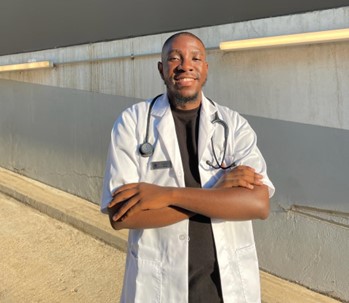Ikaneng Yingwane, student ambassador at Sefako Makgatho Health Sciences, explains how useful simulation training has been to his learning process as a student doctor.
______
During my time as a 4th-year medical student, one experience that stands out vividly in my memory is the day we had our first simulation training. We walked into a room full of lifelike mannequins, screens, and medical tools that looked just like a real hospital. The room was buzzing with excitement and a bit of nervousness as we put on our white coats and stethoscopes.
I felt both curious and nervous. Could we use what we'd learned from books and classes on these simulated patients? Would we make mistakes? And most importantly, could we learn from those mistakes without hurting anyone?
Our instructor, Nurse (Sr) Venter, started by telling us why we were doing simulation training. She said it was a safe place to practice and improve our skills without any real-life risks. It was a chance to learn from mistakes and get better before working with real patients.
We split into small groups for different scenarios. My group had to care for a simulated patient who was having chest pain. I was picked as the leader, which was both exciting and nerve-wracking.
The scenario started, and I got really into it. The mannequin seemed almost real with its breathing and heartbeat. My team and I worked together to check the patient, order tests, and come up with a treatment plan. It was tough but also really rewarding.
During the simulation, we ran into some unexpected problems. The mannequin's blood pressure suddenly dropped, and we had to act fast to help. Another time, we got an ECG reading wrong, so we had to rethink our diagnosis.
After each scenario, Mafisa talked with us about what went well and what we could do better. She encouraged us to think about our actions, learn from our mistakes, and figure out how to do things differently next time.
Looking back, that first simulation training was a big moment in my medical education. It taught me how important teamwork, talking to each other, and being flexible are in a hospital setting. It also gave me the confidence to trust my judgment, even when things got tricky.
Simulation training is really important in medical school for a few reasons. First, it's a safe place to practice skills and procedures. If we mess up during simulation, it's okay because no real patients are at risk. This helps us learn and get better at what we do.
Second, simulation training helps us work well with others. In these scenarios, we learn how to work together, share tasks, and communicate clearly. These are all important skills for working in a hospital, where teamwork is key.
Lastly, simulation training lets us see lots of different medical situations that we might not see during our regular hospital rotations. This helps us learn more and be ready for whatever comes our way in our future careers.
In conclusion, simulation training is a really helpful part of medical school. It lets us practice and get better at our skills in a safe environment, helps us work well with others, and exposes us to lots of different medical situations. As I continue on my path to becoming a Doctor, I'm thankful for the chances I've had to learn and improve through simulation training. It's prepared me for the challenges of working in medicine and has taught me the importance of always learning and growing.

______
To read more student articles like this visit our student hub.